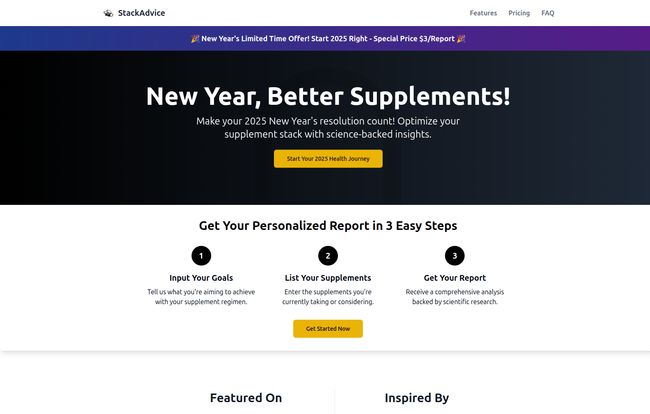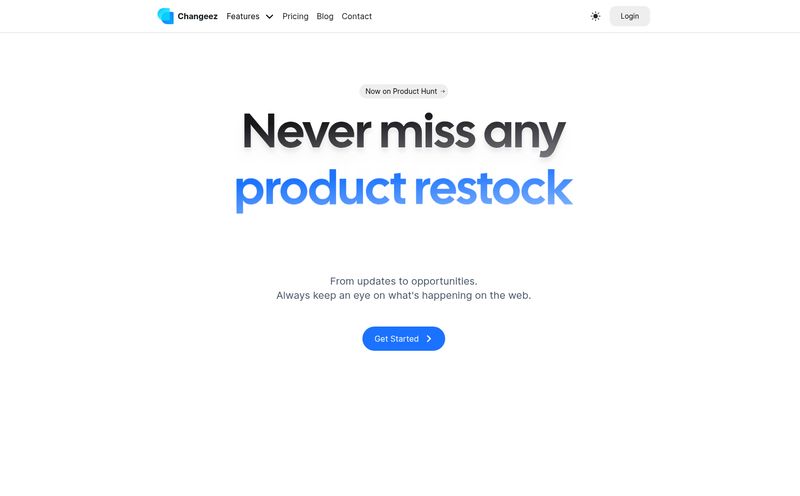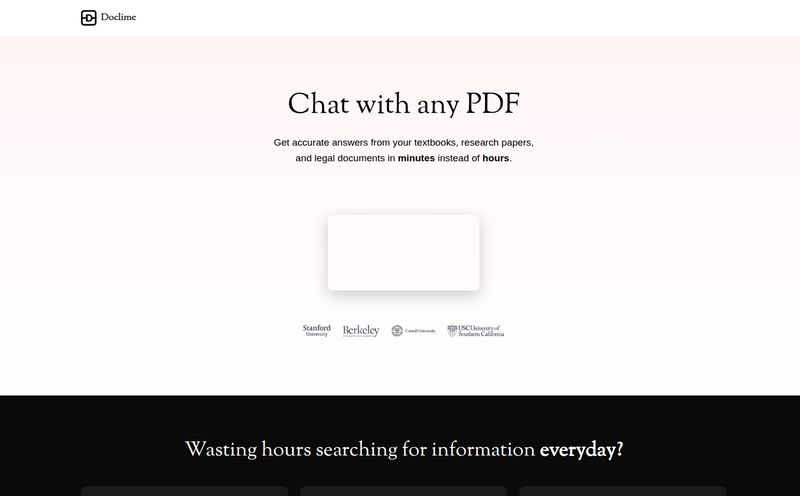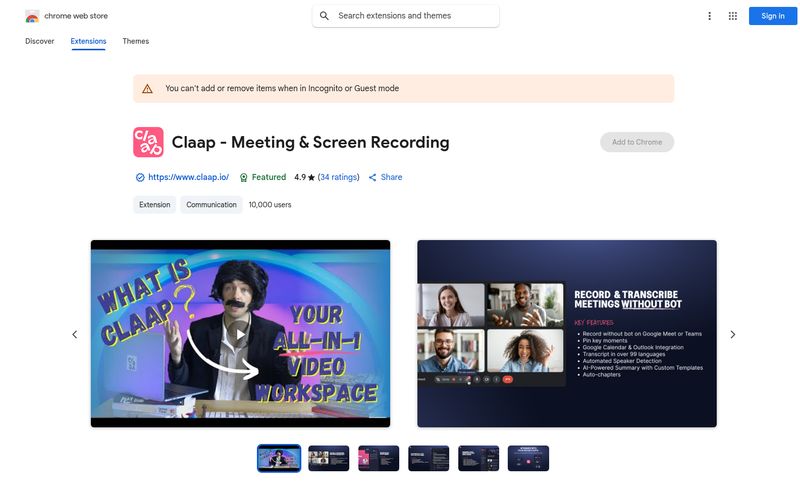If you’ve ever ventured into the world of health supplements, you know the feeling. You start with something simple, maybe some Vitamin D because, well, you live in a place with four distinct seasons and one of them is called “grey.” Before you know it, your cabinet looks like a GNC exploded, and you're neck-deep in Reddit threads on r/Nootropics, trying to figure out if your L-Theanine dose is cancelling out your Ashwagandha.
It’s a rabbit hole. A fascinating, but often confusing, rabbit hole. For years, we’ve been our own biochemists, piecing together advice from forums, bloggers (guilty as charged), and the occasional scientific abstract we pretend to fully understand. It's a mess. So when I saw a tool called StackAdvice pop up on Product Hunt, claiming to bring order to this chaos, my skeptical-but-hopeful SEO heart skipped a beat.
A tool inspired by the very Reddit communities that define the space? One that uses AI to do the heavy lifting? Okay, you have my attention.
So What Exactly is This StackAdvice Thing?
Think of StackAdvice as your personal research assistant. You tell it what you want to achieve—maybe it's better focus for work, improved athletic recovery, or just general well-being—and then you list the supplements you’re taking or considering. It then takes that information, runs it through its AI brain, and spits out a personalized report.
It’s not just pulling from some static, dusty database. The platform claims to perform a real-time search through millions of scientific papers to give you the most current insights. It’s like having a super-fast, non-judgmental nerd do all your homework for you. The whole process is broken down into three dead-simple steps:
- Input Your Goals: Tell the AI what you're trying to do.
- List Your Supplements: Enter what’s in your current stack.
- Get Your Report: Receive your analysis.
Easy enough. The simplicity is honestly what drew me in. No endless forms, no blood work required (though you should always get that done!), just a straight-up analysis of your chosen stack against your stated goals.
Putting It to the Test: A Quick Walkthrough
I couldn't just talk about it, I had to try it. I decided to run a pretty classic nootropic stack through the wringer: Caffeine, L-Theanine, Omega-3, and some good old Vitamin D. My goal? The eternally sought-after “improve cognitive function and energy levels.”
The interface is clean, no fluff. You type in your goal, add your supplements one by one, and that’s pretty much it. A few moments later, you have your report.

Visit StackAdvice
The report itself is the main event, and it's where you see the value. It’s not just a thumbs-up or thumbs-down. It’s a breakdown of why certain things might work together, what the science says, and—crucially—what potential conflicts or side effects to watch out for.
The Science Behind the Curtain
Here’s what I find most interesting as a data guy. StackAdvice isn't just a fancy search engine. It's a synthesis tool. Anyone can go to PubMed and get lost for days. I’ve done it. You find one study that says caffeine is the greatest thing ever, and another that links it to anxiety and poor sleep. Context is everything.
StackAdvice’s AI aims to provide that context. It sifts through the noise to find research relevant to your specific combination of supplements and goals. It’s looking for synergy (how supplements might work better together) and antagonism (how they might interfere with each other). This is a task that would take a human hours, if not days, of dedicated research.
Breaking Down the StackAdvice Report
So, what do you actually get for your money? The report is pretty comprehensive. It’s not a novel, but it’s dense with useful, actionable information.
The Personalized Relevance Summary
This is your executive summary. It gives you the top-level view of how your stack aligns with your goals based on the available evidence. It’s the “Is this a good idea?” part of the report, delivered in plain English.
Research Highlights and Potential Side Effects
This, for me, is the core value. For each supplement in your stack, it pulls out key findings from scientific literature. But it doesn't just show you the good stuff. The side effects analysis is huge. It's one thing to know that Omega-3 is good for your brain; it's another to be reminded that in high doses, it can have blood-thinning effects, which might be a problem if you’re on certain medications. This is responsible intelligence, and I’m here for it.
Curated Studies and Recommendations
Beyond just analyzing what you’ve already got, the report also includes links to relevant studies so you can do your own deep dive if you want. It might also suggest other supplements that have been studied for your goals. For instance, if you're aiming for cognitive enhancement, it might point you towards studies on Bacopa Monnieri or Lion's Mane, giving you avenues for future experimentation.
Let's Talk About the Price Tag
Alright, let’s get to the bottom line. How much does this magic cost? I was expecting a subscription model, maybe $20 a month or something. I was wrong.
Right now, StackAdvice is running a special where a single report costs just $3. The regular price is $9. Let me repeat that. Three dollars.
That is, frankly, a ridiculous bargain. A single bottle of quality supplements can cost you $30, $40, or more. The ability to spend three bucks to verify if that $40 purchase is even a good idea for your specific situation seems like a no-brainer. It’s less than a fancy cup of coffee, and it could save you a lot of money and potential headaches down the line.
The Good, The Bad, and The AI
No tool is perfect, and a review isn't honest without looking at the full picture. So here’s my breakdown.
What's great about it? It saves an incredible amount of time and cuts through the marketing nonsense that plagues the supplement industry. The side effect analysis is a genuinely valuable safety feature. And again, the price is almost too low.
Now for the caveats. First and foremost, and this is important: StackAdvice is not a doctor. It's an information tool. It cannot diagnose, treat, or cure any condition. You should always, always, always talk to a qualified healthcare professional before starting or changing your supplement regimen. This tool should supplement—pun intended—their advice, not replace it.
Second, a report is limited to analyzing a maximum of 8 supplements. For most people, that’s probably fine. But for the serious biohacker with a 15-item stack, you might need to run a couple of reports. Lastly, the report's quality is directly dependent on the accuracy of the information you provide. Garbage in, garbage out, as they say in the tech world.
Who Is This Tool Actually For?
I see a few groups getting a ton of value out of this:
- The Supplement Beginner: Someone who is feeling overwhelmed and just wants to know if the three things they bought at the health food store are a good starting point.
- The Reddit Researcher: The person who already spends hours in forums but wants a science-backed second opinion to confirm or challenge what they've learned.
- The Skeptical Veteran: Someone like me, who's been taking supplements for years but wants an objective check-in to optimize their stack and screen for potential issues they might have overlooked.
- Anyone Tired of Guesswork: If you're just randomly combining supplements based on blog posts and hoping for the best, this tool is a tiny investment in a much smarter approach.
My Final Verdict
StackAdvice is a fantastic step in the right direction. It brings a layer of data-driven sanity to a world that’s often filled with hype and anecdotal evidence. It democratizes access to scientific research, translating complex studies into a format that’s easy to digest and act on.
It won't give you all the answers, and it's not a magic pill. But it is an incredibly powerful and affordable compass. It can help you navigate the murky waters of supplementation with more confidence and less guesswork. For just a few dollars, it provides a level of personalized insight that was previously reserved for those with the time and expertise to spend days buried in research libraries. And for that reason, it gets a strong recommendation from me.
Frequently Asked Questions
- What is StackAdvice?
- StackAdvice is an AI-powered platform that analyzes your supplement stack based on your personal health goals. It provides a personalized report with science-backed insights, research highlights, and potential side effects.
- How does it work?
- It uses a combination of artificial intelligence, real-time searches of scientific papers, and a large supplement database. You input your goals and your list of supplements, and the AI synthesizes the information to create your report.
- How much does a report cost?
- Currently, a report costs $3 as part of a special offer. The regular price is $9. Each report can analyze a stack of up to 8 supplements.
- Is StackAdvice a replacement for medical advice?
- No, absolutely not. StackAdvice is an informational tool designed to help you understand the research behind your supplements. It is not a substitute for professional medical advice, diagnosis, or treatment. Always consult with your doctor.
- What kind of information is in the report?
- A report includes a personalized relevance summary, highlights from scientific research for each supplement, a side effects analysis, and links to relevant studies. It may also provide evidence-based recommendations for other supplements to research.
- Can I analyze more than 8 supplements at once?
- Currently, each report is limited to an analysis of 8 supplements. If your stack is larger, you would need to generate more than one report to cover all of your supplements.
Reference and Sources
- StackAdvice Official Website
- StackAdvice Pricing Information
- Product Hunt
- The r/StackAdvice Subreddit
- PubMed - For conducting your own medical research.



